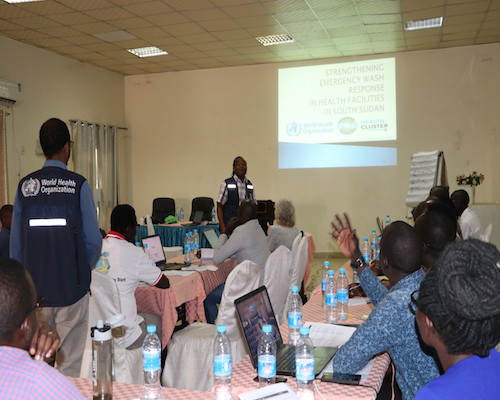Healthy Soch
Juba, February 18, 2019:
Provision of medical emergency kits for essential lifesaving health interventions is vital to investigate suspected disease outbreaks and respond in a timely manner, and save the lives of displaced populations, said Dr Olushayo Olu, WHO Representative for South Sudan.
The protracted crises in South Sudan coupled with frequent disease outbreaks, and a high burden of both communicable and non-communicable diseases including mental and psychosocial conditions, has resulted in the deterioration of the health status of the population. In addition, supplies of medicines and medical commodities have been irregular and inadequate, leading to frequent stock-outs and interruptions of essential service delivery.
With funding from the South Sudan Humanitarian Fund and European Union Humanitarian Aid, WHO aims to provide critical lifesaving interventions in Kapoeta South, Magwi, Ayod, Bor South, Duk, Fangak, Nyirol, Pibor, Uror, Koch, Leer, Mayendit, Panyijiar, Rubkona, Fashoda, Longochuk, Luakpiny/Nasir, Maiwut, Malakal, Wau, Tambura and Juba, through the provision of emergency kits for crisis-affected populations and host communities to ensure access to critical medicines and treatments.
In addition, WHO in collaboration with UNICEF and UNFPA conducted a joint harmonized training on forecasting, procurement, distribution and rational use of medical emergency kits, non-communicable disease kits, reproductive health kits and emergency vaccines to familiarize Health Cluster partners on the types and contents of the different kits to prevent needless illness or death because of time-critical health problems and ensure accountability to beneficiaries, health cluster, WHO, Ministry of Health and donors.
As part of the ongoing efforts to ensure that health service is provided without drugs stock outs, a total of 24 participants drawn from 20 health cluster partners (National and International NGOs) were trained on requisition, distribution and rational use of emergency kits from 11-12 February 2019. Similar training will be conducted from 21 – 22 February 2019 targeting 36 precipitants from 30 Health Cluster partners to optimize the distribution and rational use of life-saving medicines.
An emergency health kit is a reliable, standardized complete set of drugs, supplies, and equipment needed to provide basic health care service to the population in need.







